The crimson bellied conure, a small and strikingly colorful parrot, is a popular choice among avian enthusiasts. Known for their vibrant plumage and charming personalities, these birds make excellent pets. In this comprehensive guide, we will delve into the world of crimson bellied conures, covering their natural habitat, care requirements, behavior, and more. Whether you’re a prospective owner or simply curious about these feathered friends, this article will provide you with valuable insights.
All About the Crimson Bellied Conure
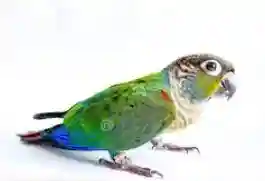
The Crimson Beauty
The crimson bellied conure, scientifically classified as Pyrrhura perlata, is a neotropical parrot species native to South America. Its most distinguishing feature is its crimson-red belly, which contrasts vividly with its lush green plumage. These parrots are relatively small, measuring about 9 to 10 inches (23 to 25 cm) in length.
Natural Habitat
Crimson bellied conures are primarily found in the wild across various regions of South America. They inhabit dense tropical forests, preferring areas with plenty of trees, fruits, and seeds. These parrots are social creatures and often live in flocks, making them a fascinating sight in their natural habitat.
Captivating Personalities
One of the reasons why crimson bellied conures are so beloved is their charming personalities. They are known for their playfulness and curious nature. These parrots are also highly social and thrive on interaction with their human companions.
Description and Characteristics of Crimson Bellied Conure
The Crimson Bellied Conure, scientifically known as Pyrrhura perlata, is a captivating parrot species cherished for its striking appearance and charming personality. Let’s explore the key descriptions and characteristics that make these birds truly unique:
| Characteristic | Description |
|---|---|
| Plumage | Vibrant green with a striking crimson-red belly |
| Size | Approximately 9 to 10 inches (23-25 cm) in length |
| Tail Feathers | Long and tapered, used for balance and maneuverability |
| Behavior | Playful, social, and intelligent |
| Vocalization | Communicative with a range of sounds |
| Native Habitat | South American tropical forests |
| Lifespan | 20 to 25 years with proper care |
Crimson Bellied Conure Physical Description
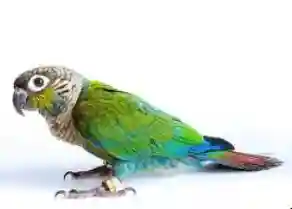
- Vibrant Plumage: One of the most defining features of the crimson bellied conure is its stunning plumage. It boasts vibrant green feathers covering its body, creating a lush and eye-catching appearance.
- Crimson Belly: As the name suggests, these con1ures have a brilliantly crimson-red belly that contrasts dramatically with their green plumage. This bold coloration extends from their throat down to their lower abdomen.
- Size: Crimson bellied conures are relatively small parrots, measuring around 9 to 10 inches (23-25 cm) in length. Their petite size makes them an ideal choice for those with limited space.
- Tail Feathers: They have long, tapered tail feathers that add to their overall elegance. These tail feathers are often used for balance and maneuverability.
Behavior and Personality
- Playful Nature: Crimson bellied conures are renowned for their playful and active disposition. They love engaging in various activities, including climbing, chewing on toys, and exploring their surroundings.
- Social Creatures: These conures are highly social birds that thrive on interaction with their human companions. They enjoy being the center of attention and can form strong bonds with their owners.
- Vocalization: While not as loud as some larger parrot species, crimson bellied conures are still relatively vocal. They emit a range of sounds, from soft chirps to occasional squawks, to communicate and express their moods.
- Intelligence: These birds are intelligent and can quickly learn tricks and commands with proper training. Their curiosity and willingness to learn make them enjoyable pets to teach and engage with.
Habitat and Range
- Native Habitat: Crimson bellied conures are indigenous to South America, primarily found in countries like Brazil, Bolivia, and Argentina. They inhabit lush, tropical forests with an abundance of trees, fruits, and seeds.
- Wild Behavior: In their natural habitat, these conures are often seen in small flocks. They are agile flyers and can navigate through dense vegetation with ease.
Life Span
- Longevity: With proper care and a suitable environment, crimson bellied conures can live a remarkably long life. Their lifespan typically ranges from 20 to 25 years, making them a long-term commitment for potential owners.
Crimson Bellied Conure Lifespan
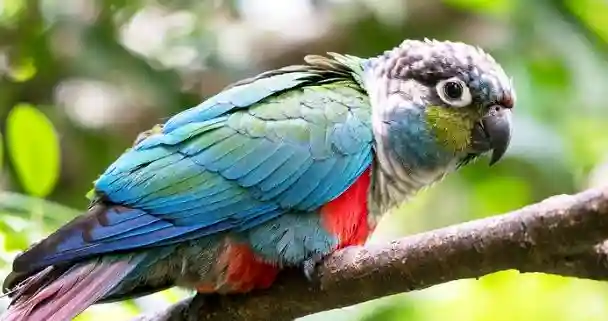
The lifespan of a crimson bellied conure can vary depending on various factors, including their care, genetics, and overall health. On average, these colorful parrots can live for approximately 20 to 25 years when provided with proper care and attention. However, some crimson bellied conures2 have been known to live even longer with exceptional care and a suitable living environment. Potential owners need to be aware of this long-term commitment when considering these delightful birds as pets.
Bringing a Crimson Bellied Conure Home
Choosing the Right Cage
Before bringing a crimson bellied conure home, it’s vital to set up a suitable living space for them. Opt for a spacious cage that allows ample room for flying and climbing. Ensure the bars are spaced closely to prevent any accidents.
A suitable cage for a single crimson bellied conure should have the following dimensions as a minimum guideline:
- Width: Approximately 24 to 30 inches (61 to 76 centimeters)
- Depth: Around 18 to 24 inches (46 to 61 centimeters)
- Height: Ideally 36 to 48 inches (91 to 122 centimeters)
These dimensions provide enough space for your conure to move, stretch its wings, and exercise comfortably. It’s also advisable to choose a cage with horizontal bars to facilitate climbing and perching.
Crimson Bellied Conure Diet and Nutrition
Maintaining a balanced diet is vital for the health of your crimson bellied conure. These parrots enjoy a variety of foods, including fresh fruits, vegetables, seeds, and high-quality pellets. Providing a diverse diet ensures they receive all the essential nutrients.
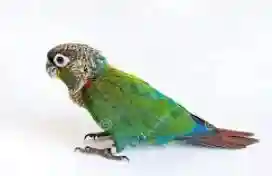
Here’s a comprehensive guide to their diet and nutritional requirements:
1. Pellets:
- High-quality commercial pellets specifically formulated for small to medium-sized parrots are an excellent foundation for a crimson bellied conure’s diet. These pellets are nutritionally balanced and provide essential vitamins and minerals.
2. Fresh Fruits:
- Incorporate a variety of fresh fruits into their diet, such as apples, grapes, bananas, and berries. These fruits offer essential vitamins, fiber, and natural sugars. Ensure the fruits are clean and free of pesticides.
3. Vegetables:
- Offer a selection of fresh vegetables like carrots, bell peppers, broccoli, and leafy greens like kale and spinach. These veggies provide essential nutrients and dietary fiber.
4. Seeds and Nuts:
- While seeds and nuts can be part of their diet, they should be given in moderation due to their high-fat content. Use them as occasional treats or for training purposes.
5. Cooked Grains:
- Cooked grains like brown rice and quinoa can be a nutritious addition to their diet. These grains provide complex carbohydrates and can be served in small portions.
6. Protein:
- Provide a source of protein through cooked legumes like lentils or chickpeas. These legumes are rich in protein and can be offered a few times a week.
7. Calcium Supplements:
- To support their bone health, especially for egg-laying females, consider offering a calcium supplement or cuttlebone. Consult with an avian veterinarian for proper supplementation guidelines.
8. Fresh Water:
- Always provide fresh, clean water in a water dispenser that’s accessible to your crimson bellied conure. Hydration is vital for their health.
Dietary Considerations for Crimson Bellied Conure
- Variety: Aim for a diverse diet to ensure your conure receives a wide range of nutrients. Rotate the types of fruits, vegetables, and other foods regularly.
- Portion Control: Be mindful of portion sizes to prevent overfeeding. Adjust the quantity of food based on your bird’s activity level and individual needs.
- Freshness: Offer fresh foods daily and remove any uneaten items to maintain cleanliness and prevent spoilage.
- Avoid Toxins: Avoid feeding your conure foods that are toxic to birds, such as avocado, chocolate, caffeine, and alcohol.
- Consult an Avian Veterinarian: Regularly consult with an Avian veterinarian for dietary guidance, health check-ups, and any specific dietary recommendations for your crimson bellied conure.
Creating an Enriching Environment
To keep your crimson bellied conure mentally and physically stimulated, furnish their cage with toys, perches, and puzzles. These intelligent birds thrive when they have opportunities for play and mental challenges.
Social Interaction
Crimson bellied conures3 are social birds that crave human companionship. Spend quality time with your pet, engaging in activities like talking, playing, and training. They thrive on attention and bond strongly with their owners.
Understanding Their Behavior
Vocalizations
Crimson bellied conures are known for their vocal nature. They can be quite chatty, emitting a range of sounds from soft chirps to loud squawks. Understanding their vocalizations can help you decipher their moods and needs.
Playfulness
These parrots are playful by nature and enjoy games and toys. Providing them with opportunities for playtime not only keeps them happy but also helps in their mental and physical development.
Affectionate Bonds
Crimson bellied conures are affectionate birds that form strong bonds with their owners. They thrive on physical contact, such as cuddling and preening. Building a trusting relationship with your bird is essential for their well-being.
Health and Care
Regular Vet Visits
To ensure the longevity and well-being of your crimson bellied conure4, schedule regular check-ups with an avian veterinarian. They can identify and address any health concerns early on.
Grooming
Maintaining proper hygiene is essential for your pet’s health. Regularly trim their nails, beak, and provide opportunities for bathing. Consult your veterinarian for guidance on grooming.
Common Health Issues
Crimson bellied conures are susceptible to certain health issues like respiratory infections and feather plucking. Being aware of these potential problems and taking preventive measures is crucial.
Can Crimson Bellied conures talk?
While crimson bellied conures are not as known for their talking abilities as some larger parrot species, they can indeed learn to mimic words and sounds with training. However, their speech may not be as clear or extensive as that of some other parrots known for their talking abilities.
Are crimson-bellied conures rare?
Crimson-bellied conures are not considered extremely rare in aviculture, but their availability can vary depending on your location and the demand for these birds in your area. In some regions, they may be less common than more popular parrot species, but they are not typically classified as highly rare.
What is the personality of a Crimson Bellied Conure?
The personality of a crimson-bellied conure is characterized by playfulness, sociability, and intelligence. These birds are known for their active and engaging nature. They thrive on interaction with their human companions and are often affectionate, forming strong bonds. They are also intelligent and can be trained to perform tricks and commands, making them delightful pets for those who appreciate their lively disposition.
How much is a Crimson Bellied Conure?
The price of a crimson-bellied conure can vary widely depending on factors such as the bird’s age, source (breeder or pet store), location, and whether it is hand-raised or not. On average, you can expect to pay anywhere from $300 to $800 or more for a crimson-bellied conure. You do your own research and find a reputable source when purchasing a pet conure to ensure you are getting a healthy and well-cared-for bird. Prices may also fluctuate over time, so it’s advisable to check with local breeders or pet stores for current pricing.
How big are crimson bellied conures?
Crimson bellied conures are relatively small parrots. On average, they measure around 9 to 10 inches (23-25 cm) in length. Their petite size and striking plumage make them a manageable and charming choice for bird enthusiasts and pet owners.
Conclusion
Crimson bellied conures are truly beautiful birds with their striking appearance and endearing personalities. As potential pet owners, it’s essential to understand their needs and provide them with the care and attention they deserve.
Frequently Asked Questions (FAQs)
What is the lifespan of a Crimson bellied conure?
Crimson bellied conures can live up to 20-25 years when provided with proper care.
Do Crimson bellied conures require a lot of attention?
Yes, these parrots thrive on social interaction and need daily attention from their owners.
Can Crimson bellied conures learn to talk?
While they may not be as proficient as some larger parrot species, they can learn to mimic words and sounds with training.
How can I prevent my Crimson bellied conure from becoming bored?
To prevent boredom, provide a variety of toys and engage in interactive playtime with your bird.
Are Crimson bellied conures noisy pets?
They can be noisy at times, especially when excited, but their vocalizations are generally not as loud as larger parrot species.
Do Crimson bellied conures get along with other pets?
With proper introductions and supervision, they can coexist with other pets, but it’s essential to monitor their interactions.
Article Sources & Footnotes
“We at PetsCareWorld are committed to providing accurate and reliable information. Our articles are thoroughly researched, reviewed by experts, and based on high-quality sources, including vet consultations and peer-reviewed studies. You can trust the information we provide.”
Further References

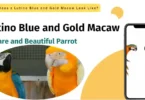





Leave a Comment
You must be logged in to post a comment.